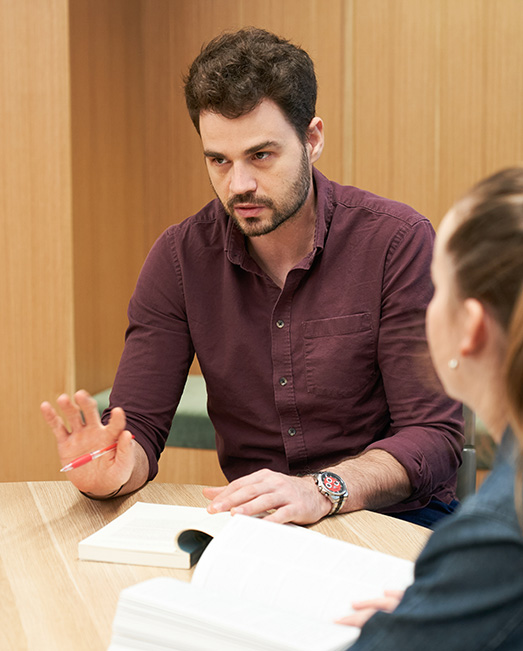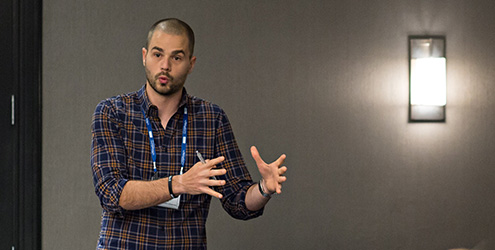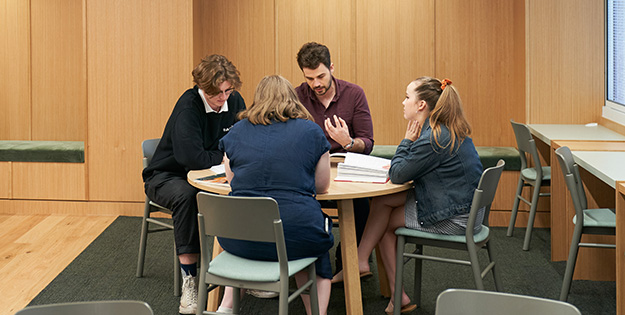Future student
Copyright@ Australian Catholic University 1998-2026 | ABN 15 050 192 660 CRICOS registered provider: 00004G | PRV12008
Copyright@ Australian Catholic University 1998-2026 | ABN 15 050 192 660 CRICOS registered provider: 00004G | PRV12008

In a university classroom in North Sydney, a philosopher named Tyler Paytas leads a small group of students in a lively discussion centred on one of the great works of Western civilisation.
The students are part of the second cohort of Ramsay Scholars – a select group of individuals who’ve earned the chance to explore a curriculum that traverses the philosophy, history, literature, politics and art of the Western intellectual tradition.
Funded by the Ramsay Centre thanks to a hefty bequest from the late philanthropist Paul Ramsay, the coveted scholarships are aimed at those with “a critical habit of mind”, and the ability to “carefully consider different views and perspectives and the dignity of those who hold them”.
“The fact that it’s a competitive scholarship program means we attract a very high calibre of student, and they tend to be motivated, and engaged in the topics we’re discussing,” says Dr Paytas, senior philosophy lecturer in ACU’s Western civilisation program.
While still young as far as university courses go, the Bachelor of Arts (Western Civilisation) takes students back thousands of years, beginning with Homer and stopping by Plato, Shakespeare, Nietzsche, Arendt and many others.

Dr Paytas teaching.
With a cohort of students from a broad range of ethnic, political, religious and socioeconomic backgrounds, the views of these young scholars are often divergent, setting the scene for some intense discussions.
Dr Paytas, who has taught at a range of institutions including Washington University in St. Louis and Johns Hopkins University’s Center for Talented Youth, says he is often impressed by the worthwhile objections and probing questions of students.
“The most engaging and fun discussions are those where a student might say, ‘I disagree with what the author is saying here’, and that leads to a vigorous debate that takes us to all sorts of different places,” he says.
“It allows for thoughtful criticism of the texts we’re engaging with, which is in itself part of the Western tradition. It’s not a monolithic tradition – it’s a tradition that encourages debate and challenges itself.”
It would be fair to say that the emergence of the new course was not without controversy.
In what has been described as an “age-old dispute”, the idea of a liberal arts degree that is dedicated to the study of Western civilisation prompted debates over its potential use as a rhetorical tool that favours the West over other cultures.
On the flipside, many have argued that the study of Western civilisation has long been in crisis – that Australian universities were shying away from teaching it, or approaching it from a stubbornly hostile point of view.
One of the issues, says Dr Paytas, is that many of the prominent figures in the Western intellectual tradition – from Aristotle and Shakespeare to Marx and Foucault – happen to be white men.
“There’s a line of thought that looks at that historical fact and says, ‘Well, any curriculum that centres on the works of these figures must be inherently sexist and racist’,” Dr Paytas says. “I think that’s a deeply misguided view, but unfortunately, it’s a view that some people have.”
He points out that the Ramsay program is not simply a series of uncritical expositions of the Western tradition; rather, it’s a warts-and-all approach that teaches the history, philosophy and culture of the West in an openly self-critical way.

“To teach a Western civ course is not to teach ‘West is best’,” he says. “Part of what we’re doing is recognising that one of the core values of Western civilisation is self-criticism, self-reflection and learning from other cultures, and these things are an essential part of trying to understand who we are, and where we came from.”
That means students in the program get the good and the bad of Western civilisation, exploring the gifts it has given the world – democracy, the idea of human rights, and the scientific method, to name a few – while acknowledging that, like all civilisations, its history has at times been characterised by violence and oppression.
“We look at some of the atrocities that have been committed, and we take a historical perspective and try to understand the context and the arguments that were made on both sides, and see where the flaws were,” Dr Paytas says.
“That means we’re constantly asking questions like, ‘What did earlier generations get right and what did they get wrong? How have we made progress, and how can we continue to make progress?’”
Years ago, when Dr Paytas was himself a student, he came across the books of classical philosophers whose work resonated with him deeply. His exposure to these historical figures was not something he actively sought out.
“It wasn’t like I was hanging out at the library one day and just stumbled upon these books – they were assigned to me as part of a curriculum,” he says. “I think that in general, the most likely place you’ll engage with these classical works is in higher education, and that shows there’s something useful and important about continuing to teach these texts at university.”
What he found to be especially powerful was that these books – some of which were written thousands of years ago – grappled with many of the same existential questions that contemporary thinkers still ponder.
“Their insights into human psychology were very accurate in terms of my experience of my own mind, and the things I was struggling with,” says Dr Paytas, whose research focuses on the works of Plato, Epictetus, Kant and Sidgwick.
“That in itself made me think, ‘Okay, there’s a lot to be learned from these texts despite their being written hundreds or even thousands of years ago’.”
Dr Paytas says that these figures, who are considered to be among history’s greatest minds, can teach us lessons about how to live in the modern world. He believes that the very act of engaging with the Western intellectual tradition equips students with analytical and communication skills that will serve them well in their future careers.
“The deep exchanges you will have while grappling with fundamental questions of value and meaning – What is justice? What is a good life? What is equality and how do we balance that with things like individual freedom? – are likely to prove transformative,” he says.
“Investigating these questions will help you to become a well-rounded person, with confidence and empathy, and awareness of the world around you. These things will help you to be a good citizen, an active participant in society, and to succeed in whatever career you aspire to.”
Keen to tap into the insights of Western civilisation? Learn more about the Ramsay Scholarships (worth up to $150,000 each) and the chance to pursue a fully funded Bachelor of Arts (Western Civilisation), Bachelor of Arts (Western Civilisation)/Bachelor of Laws, or Bachelor of Arts (Western Civilisation)/Master of Teaching (Secondary) at ACU.
Copyright@ Australian Catholic University 1998-2026 | ABN 15 050 192 660 CRICOS registered provider: 00004G | PRV12008